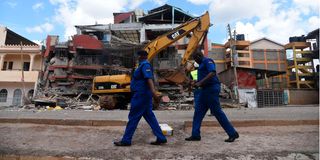Premium
MPs to approve tough new rules to curb building collapse

Police officers walking past debris of a five storey building that collapsed in Ruiru on November 21,2022.
Tough new regulations aimed at curbing the frequent collapse of buildings are waiting for MPs’ approval.
The rules, developed by the National Construction Authority (NCA), were to be tabled in Parliament last year but the House adjourned indefinitely to pave the way for the General Elections before they could be presented.
Now, the committee responsible says it will seek approval from the House.
According to the regulations, a public or private developer who defies building regulations put in place by the National Construction Authority (NCA) will be fined Sh1 million or three years imprisonment.
The Draft National Building Code, 2020 states that a developer must engage the services of a registered contractor with the technical capability to deliver a project in all construction activities in order to ensure public safety.
“By hiring a registered contractor and having a registration system in place, citizens can have increased confidence that construction work will be done by a person who has demonstrated competency,” read the regulations.
“All construction works, contracts, or projects either in the public or private sector shall be registered with the authority in accordance with the Act,” further state the regulations.
According to the new code, all buildings will be reviewed every five years to check if they still adapt to changing micro and macro environments and construction best practices worldwide.
According to NCA the decision to inspect buildings every five years is informed by a study showing that 66 per cent of buildings that collapse are already completed and lack proper maintenance.
“Buildings have a lifecycle, after which they demand high maintenance. A study established that completed buildings comprise 66 per cent of those that collapse. It implies the absence of proper maintenance and early warning of defective buildings,” the authority says.
The ministry has also pointed out that there is no proper inventory of all types of buildings in the country which could have given early warnings for those structures meeting the requirements.
“The new regulations are national and apply to all human settlements without discrimination and segregation,” reads the code.
The new Building Code 2020 has been developed following the repeal of the Local Government Act and its replacement by the County Governments Act in 2012. Consequently, the Building Code became subsidiary legislation without a parent Act.
The Draft National Building Code, 2020 is set to replace the outdated Building Code of 1968 which was found to be inadequate, lacking adequate controls and enforcement mechanisms.
“The new code provides for construction risk management in the built environment. As a result, it is less costly to prevent disaster than to cure,” reads the new code.
The National Construction Authority told MPs last week that non-compliance with standards and regulations, gaps in the construction approval process, and poor workmanship are the main reasons buildings collapse.
Parliament has been blamed for the menace as the authority says there is no Act of Parliament to operationalise the requirement of buildings to undergo mandatory inspections by qualified building professionals.
Last year, NCA told MPs that despite making substantial efforts to enhance the quality of the built environment in the country, structural failures and collapses still remain significant challenges in the construction industry.
According to NCA, unscrupulous developers continue to flout basic building procedures through the use of substandard materials, inadequate structural design and overloading of the structure, and inadequate maintenance. An increase in the number of floors eventually results in a heavier load to the substructure, leading to the collapse of the building.
More power
Officials from the authority appeared before the National Assembly Transport and Housing committee in November last year seeking amendments to the NCA Act in order to give the agency more power to draw up the regulations.
The committee, then chaired by Pokot South MP David Pkosing, gave them the green light to proceed with developing the regulations.
Mr Pkosing told the Nation that the committee offered the authority all its support.
“I managed to lobby my members and gave them the power to go and develop the regulations. They did and also got approved by the Committee on Delegated Legislation. So, all that is remaining is House approval,” Mr Pkosing said.
The Committee on Delegated Legislation is mandated to consider any statutory instrument to check whether it is in accord with the Constitution.
The committee checks whether the statutory instruments infringe on the fundamental rights and freedoms of the public and whether the statutory instruments make unusual use of the power conferred by the Constitution.





